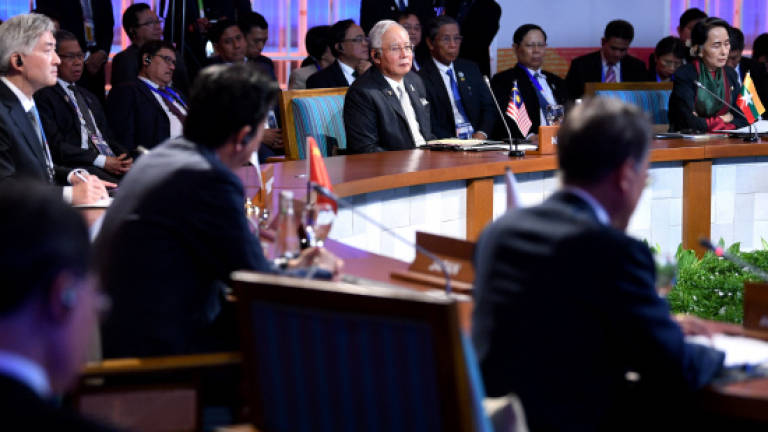Asean leaders want Myanmar to address plight of Rohingya

MANILA: Asean leaders want the Myanmar government to continue to implement the recommendations of the final report of the Advisory Commission on Rakhine State and take steps to address the Rohingya refugee crisis.
In the chairman's statement released two days after the end of the 31st Asean Summit and Related Summits, the leaders expressed support for Myanmar's humanitarian relief programme and welcomed the launch of the Myanmar government-led mechanism in cooperation with the Red Cross movement and assistance from the international community in these endeavours.
They underscored the importance of increased humanitarian access to the affected areas and that assistance be given to all affected communities.
The statement, however, did not mention the Rohingya people by name, but instead touched on the situation in Northern Rakhine State, from where over 600,000 people have fled to neighbouring Bangladesh following the military crackdown on militants who had attacked three police outposts on Aug 25.
On Tuesday, Prime Minister Datuk Seri Najib Abdul Razak, who led the Malaysian delegation to the Summit, said Malaysia's efforts to highlight the plight of the Rohingya minority ethnic group had paid off as the major world powers, including the United States had stepped forward to address the issue.
The commission, led by former United Nations secretary-general Kofi Annan, recommended, among others, that the Myanmar government take concrete steps to end enforced segregation of Rakhine Buddhists and Rohingya Muslims, to ensure full and unfettered humanitarian access throughout the state, and to tackle the Rohingya's statelessness and "revisit" the 1982 Citizenship Law.
In the chairman's statement , Asean said it welcomed the commitment of the Myanmar authorities to ensure the safety of civilians, take immediate steps to end the violence in Rakhine, restore normal socio-economic conditions, and address the refugee problem through a verification process.
They expressed support to the Myanmar government in its efforts to bring peace, stability, rule of law and to promote harmony and reconciliation between the various communities, as well as sustainable and equitable development in Rakhine State.
According to officials, the final chairman's statement was delayed due to the lack of consensus on several sensitive issues, including the Rohingya's plight and the South China Sea tussle.
The leaders also announced the appointment of Datuk Paduka Lim Jock Hoi, permanent secretary at Brunei's Ministry of Foreign Affairs and Trade, as the new secretary-general of Asean, taking over from Le Luong Minh.
On the South China Sea tension, the leaders welcomed the adoption of the framework of the Code of Conduct for the South China Sea (COC), which will facilitate the work and negotiation for the conclusion of a substantive and effective COC.
Taking note of the improving relations between Asean and China, they looked forward to the start of substantive negotiations on the COC with China at the 20th Asean-China Summit and the subsequent convening of the 23rd Asean-China Joint Working Group Meeting on the Implementation of the DOC in Vietnam in early 2018.
Various measures being undertaken by various parties could reduce tensions, and the risks of accidents, misunderstandings and miscalculation, they said.
"We likewise reaffirm the importance of maintaining and promoting peace, security, stability, maritime safety and security, rules-based order and freedom of navigation in and overflight above the South China Sea," the statement noted.
The leaders also recognised the deep concern of some Asean member states over issues relating to restricting market access for palm oil in the European market.
"Restrictions do not reflect the commitment of the global community towards meeting the Sustainable Development Goals and entail adverse implications for the palm oil industry, a critical economic element in producer countries within Asean," it said.
During the Asean-European Union Summit here, Najib and Indonesian President Jokowi had voiced out their disappointment over the restriction against palm oil into the EU which will jeopardise more than 18 million smallholders in both countries, which account for 82% of the global production. — Bernama